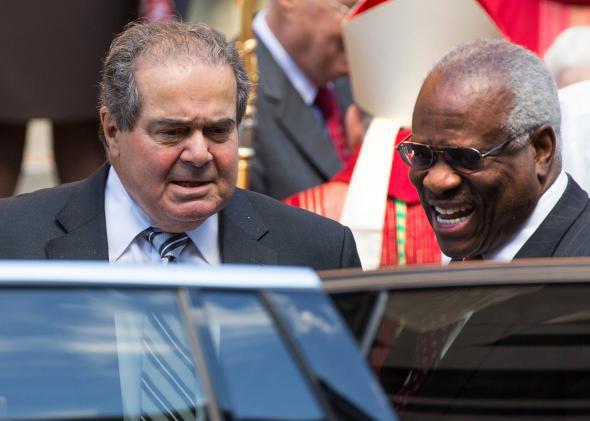Early Monday morning, the Supreme Court refused to stay a federal judge’s order invalidating Alabama’s ban on same-sex marriage. In doing so, the justices immediately set up a constitutional crisis between the state’s lawless chief justice and the federal judiciary. They also effectively admitted what court-watchers have suspected for months: The court is preparing to rule in favor of nationwide marriage equality at the end of this term.
Here’s how Monday’s decision reveals the justices’ intention to strike down gay marriage bans across the country. Typically, the justices will stay any federal court ruling whose merits are currently under consideration by the Supreme Court. Under normal circumstances, that is precisely what the court would have done here: The justices will rule on the constitutionality of state-level marriage bans this summer, so they might as well put any federal court rulings on hold until they’ve had a chance to say the last word. After all, if the court ultimately ruled against marriage equality, the Alabama district court’s order would be effectively reversed, and those gay couples who wed in the coming months would find their unions trapped in legal limbo.
But that is not what the court did here. Instead, seven justices agreed, without comment, that the district court’s ruling could go into effect, allowing thousands of gay couples in Alabama to wed. That is not what a court that planned to rule against marriage equality would do. By permitting these marriages to occur, the justices have effectively tipped their hand, revealing that any lower court’s pro-gay ruling will soon be affirmed by the high court itself.
Don’t believe me? Then ask Justice Clarence Thomas, who, along with Justice Antonin Scalia, dissented from Monday’s denial of a stay. (Oddly—and perhaps tellingly—Chief Justice John Roberts and Justice Samuel Alito, two other foes of marriage equality, didn’t bother to join Thomas’ dissent.) The court’s “acquiescence” to gay marriage in Alabama, Thomas wrote, “may well be seen as a signal of the Court’s intended resolution” of the constitutionality of gay marriage bans. Thomas and Scalia meant this to be a grave warning. The rest of us, however, should take it as a white flag—and a cause for celebration.
